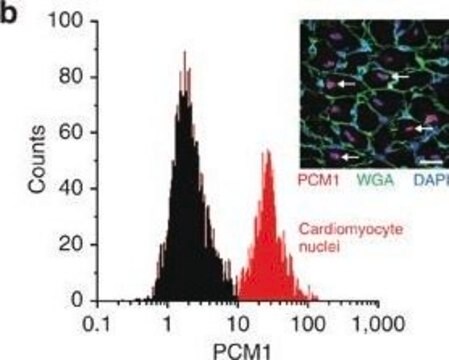SAB4200753
Anti-phospho-AKT (pThr450) antibody, Mouse monoclonal
clone AK-11, purified from hybridoma cell culture
Sinonimo/i:
Anti-Protein Kinase B, Anti-V-Akt Murine Thymoma Viral Oncogene Homolog 1
About This Item
Prodotti consigliati
Origine biologica
mouse
Livello qualitativo
Forma dell’anticorpo
purified from hybridoma cell culture
Tipo di anticorpo
primary antibodies
Clone
AK-11, monoclonal
Forma fisica
buffered aqueous solution
PM
~56 kDa
Reattività contro le specie
mouse, chicken, rat, human
Concentrazione
~1.0 mg/mL
tecniche
immunoblotting: 1-2 μg/mL using human breast cancer cell line MCF-7 extract
immunofluorescence: 1-2 μg/mL using mouse embryo fibroblast NIH-3T3 cells
immunoprecipitation (IP): 2-4 μg/test using whole extract of mouse embryo fibroblast NIH-3T3 cell line
Isotipo
IgG2a
N° accesso UniProt
Condizioni di spedizione
dry ice
Temperatura di conservazione
−20°C
modifica post-traduzionali bersaglio
phosphorylation (pThr450)
Informazioni sul gene
human ... AKT1(207)
Descrizione generale
Specificità
Immunogeno
Applicazioni
- immunoblotting
- immunofluorescence
- immunoprecipitation
Azioni biochim/fisiol
Stato fisico
Stoccaggio e stabilità
Esclusione di responsabilità
Non trovi il prodotto giusto?
Prova il nostro Motore di ricerca dei prodotti.
Codice della classe di stoccaggio
10 - Combustible liquids
Classe di pericolosità dell'acqua (WGK)
WGK 2
Punto d’infiammabilità (°F)
Not applicable
Punto d’infiammabilità (°C)
Not applicable
Certificati d'analisi (COA)
Cerca il Certificati d'analisi (COA) digitando il numero di lotto/batch corrispondente. I numeri di lotto o di batch sono stampati sull'etichetta dei prodotti dopo la parola ‘Lotto’ o ‘Batch’.
Possiedi già questo prodotto?
I documenti relativi ai prodotti acquistati recentemente sono disponibili nell’Archivio dei documenti.
Il team dei nostri ricercatori vanta grande esperienza in tutte le aree della ricerca quali Life Science, scienza dei materiali, sintesi chimica, cromatografia, discipline analitiche, ecc..
Contatta l'Assistenza Tecnica.